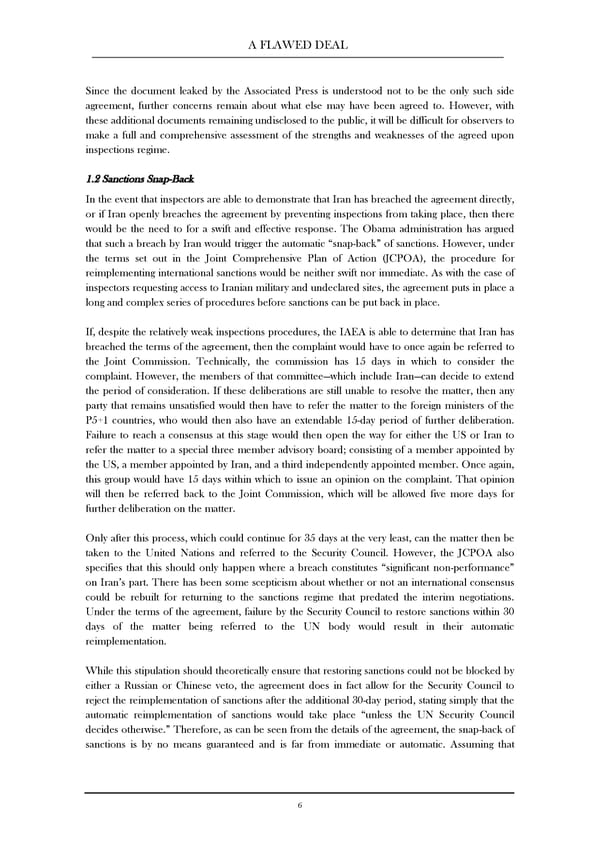! A FLAWED DEAL Since the document leaked by the Associated Press is understood not to be the only such side agreement, further concerns remain about what else may have been agreed to. However, with these additional documents remaining undisclosed to the public, it will be difficult for observers to make a full and comprehensive assessment of the strengths and weaknesses of the agreed upon inspections regime. 1.2 Sanctions Snap-Back In the event that inspectors are able to demonstrate that Iran has breached the agreement directly, or if Iran openly breaches the agreement by preventing inspections from taking place, then there would be the need to for a swift and effective response. The Obama administration has argued that such a breach by Iran would trigger the automatic “snap-back” of sanctions. However, under the terms set out in the Joint Comprehensive Plan of Action (JCPOA), the procedure for reimplementing international sanctions would be neither swift nor immediate. As with the case of inspectors requesting access to Iranian military and undeclared sites, the agreement puts in place a long and complex series of procedures before sanctions can be put back in place. If, despite the relatively weak inspections procedures, the IAEA is able to determine that Iran has breached the terms of the agreement, then the complaint would have to once again be referred to the Joint Commission. Technically, the commission has 15 days in which to consider the complaint. However, the members of that committee—which include Iran—can decide to extend the period of consideration. If these deliberations are still unable to resolve the matter, then any party that remains unsatisfied would then have to refer the matter to the foreign ministers of the P5+1 countries, who would then also have an extendable 15-day period of further deliberation. Failure to reach a consensus at this stage would then open the way for either the US or Iran to refer the matter to a special three member advisory board; consisting of a member appointed by the US, a member appointed by Iran, and a third independently appointed member. Once again, this group would have 15 days within which to issue an opinion on the complaint. That opinion will then be referred back to the Joint Commission, which will be allowed five more days for further deliberation on the matter. Only after this process, which could continue for 35 days at the very least, can the matter then be taken to the United Nations and referred to the Security Council. However, the JCPOA also specifies that this should only happen where a breach constitutes “significant non-performance” on Iran’s part. There has been some scepticism about whether or not an international consensus could be rebuilt for returning to the sanctions regime that predated the interim negotiations. Under the terms of the agreement, failure by the Security Council to restore sanctions within 30 days of the matter being referred to the UN body would result in their automatic reimplementation. While this stipulation should theoretically ensure that restoring sanctions could not be blocked by either a Russian or Chinese veto, the agreement does in fact allow for the Security Council to reject the reimplementation of sanctions after the additional 30-day period, stating simply that the automatic reimplementation of sanctions would take place “unless the UN Security Council decides otherwise.” Therefore, as can be seen from the details of the agreement, the snap-back of sanctions is by no means guaranteed and is far from immediate or automatic. Assuming that 6 ! !
 A Flawed Deal Page 8 Page 10
A Flawed Deal Page 8 Page 10